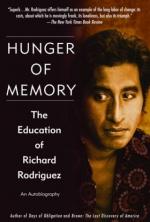|
This section contains 5,105 words (approx. 13 pages at 400 words per page) |

|
In the following essay, Pérez Firmat explores Rodriguez's non-confessional background, its influence on his undertaking an autobiography, and its impact on the details of his story.
Perhaps because the testimonial impulse is especially strong in emergent literatures, the flowering of imaginative writing by U. S. Hispanics over the last fifteen or twenty years has included many notable memoirs and autobiographies. Indeed, it is hardly an overstatement to say that, up to now, the dominant genre of latino literature has been one or another mode of self-writingeither straightforward memoirs like Ernesto Galarza's Barrio Boy (1971) or Esmeralda Santiago's When I Was Puertorican (1993); fictional autobiographies like Edward Rivera's Family Installments (1982) or Sandra Cisneros's The House on Mango Street (1989); or hybrid combinations of prose and poetry, fiction and nonfiction, like Cherríe Moraga's Loving in the War Years (1983) or Judith Ortiz Cofer's
The Latin Deli (1993).But without...
|
This section contains 5,105 words (approx. 13 pages at 400 words per page) |

|




